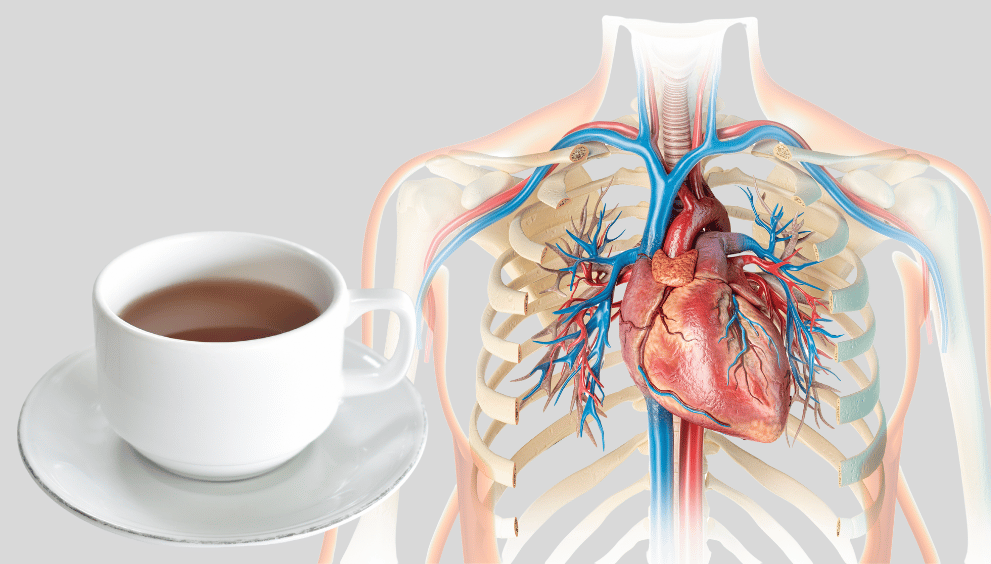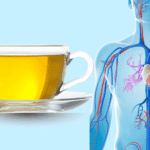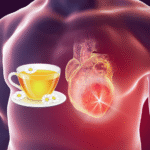Heart palpitations can be scary, but the right tea may help. Discover 7 calming teas backed by science, how they work, and when to see a doctor. Have you ever felt your heart skip a beat, flutter, or race for no apparent reason? You’re not alone. Heart palpitations can be scary. Many people attribute these issues to simple factors, such as stress, poor circulation, or low magnesium levels. The good news? Nature offers gentle remedies that may help restore balance to your heartbeat. In this article, we’ll explore the seven best teas for heart palpitations.
Herbalists and doctors strongly recommend these teas. Clinical studies support their benefits. You’ll learn how each tea works, what to avoid, and when to see a cardiologist. If you want to help your heart naturally and calm those odd rhythms, keep reading. Don’t miss our free guide to the best herbal teas for heart health at the end.
The best teas for heart palpitations include:
- Hawthorn berry tea (improves blood flow to the heart).
- Motherwort tea (calms erratic heartbeats).
- Magnesium-rich hibiscus tea (balances electrolytes).
- Peppermint tea (stimulates the vagus nerve).
Always consult a doctor if palpitations persist.
Purpose: We reviewed over 15 teas based on cardiology studies and recommendations from herbalists. Our goal was to identify the safest and most effective options, as well as those to avoid. In this guide, you will discover.
The 7 best teas for stabilizing heart rhythm (backed by science).
- How stress, caffeine, and electrolytes impact palpitations.
- When to sip—and when to skip—your favorite brews.
- Red flags that mean it’s time to see a doctor.
2. How Tea May Help with Heart Palpitations
Stress & Palpitations
- Stress triggers adrenaline spikes, which can disrupt heart rhythm.
- Chamomile and lemon balm have compounds that help you relax. They boost GABA, a neurotransmitter that promotes calmness. They also lower cortisol, the stress hormone. (Study: Journal of Advanced Nursing, 2016)
Electrolyte Imbalance
- Low magnesium or potassium can contribute to irregular heartbeats (arrhythmias).
- Hibiscus tea is high in magnesium. Coconut water-infused herbal blends provide potassium.
Circulation & Heart Rhythm
- Motherwort acts as a mild beta-blocker (Journal of Ethnopharmacology, 2020).
- Hawthorn berry tea strengthens blood vessels. It also improves coronary blood flow, which supports a steady heart rhythm. In other words, it improves coronary blood flow (Phytomedicine, 2018).
- Motherwort has mild beta-blocker-like effects, regulating rapid or erratic heartbeats.
Note: These teas can help with occasional palpitations. However, if symptoms are severe or persist for an extended period, consult a doctor. Avoid caffeinated teas, like black or green tea, if caffeine triggers your palpitations.
3. Seven Best Teas for Heart Palpitations
1. Hawthorn Berry Tea (Best for Circulation)
Hawthorn berries contain flavonoids that promote heart health. Flavonoids help widen blood vessels. They boost coronary circulation and keep your heartbeat steady. It is often used in both traditional and clinical settings. This applies to mild heart rhythm issues and early-stage heart failure.
Avoid if you take blood pressure or heart meds. Hawthorn can boost their effects, which may lower your blood pressure too much.
Brewing Tip: Use 1–2 teaspoons of dried hawthorn berries for each cup. Steep them for 10 minutes to get the most flavonoids.
Top Brand: Traditional Medicinals Organic Hawthorn with Hibiscus
2. Motherwort Tea (Fast-Acting Calm)
How it helps: Motherwort is a strong herbal nervine. It calms heart palpitations. This is especially true for those caused by anxiety or hormonal changes. It can lower PVCs (premature ventricular contractions) by working as a mild natural beta-blocker. This helps slow a fast heart and maintain a steady rhythm.
Avoid if you’re pregnant or trying to conceive. Motherwort can stimulate uterine contractions and is not safe during pregnancy.
Brewing Tip: Use one teaspoon of dried motherwort per cup of boiling water. Steep for 10–15 minutes for the most excellent calming effect.
Top Brand: Starwest Botanicals Organic Motherwort—Shop Now
3. Hibiscus Tea (Magnesium Powerhouse)
How it helps: Hibiscus tea is high in magnesium. This mineral supports a healthy heart rhythm. It also helps prevent palpitations caused by electrolyte imbalance. It also lowers blood pressure naturally. Additionally, it has mild diuretic effects, which reduce strain on the heart.
Avoid if you have low blood pressure, take diuretics, or use antihypertensive meds. It may boost their effects.
Brewing Tip: Steep one tablespoon of dried hibiscus petals in hot water for 5–7 minutes. Add honey or lemon to balance their tart flavor.
Top Brand: Yogi Organic Hibiscus Bliss—Shop Now
4. Peppermint Tea (Vagus Nerve Support)
How it helps: Peppermint tea can help with heart rhythm. It gently stimulates the vagus nerve. This nerve calms the nervous system and controls the heartbeat. It’s beneficial for palpitations linked to anxiety, gas, or digestive issues.
Skip it if you have acid reflux (GERD). Peppermint can relax the lower oesophageal sphincter, potentially worsening symptoms.
Brewing Tip: Use one heaping teaspoon of dried peppermint leaves per cup of water. Steep for 7–10 minutes to extract the full calming benefits.
Top Brand: Traditional Medicinals Organic Peppermint—Shop Now
5. Chamomile Tea (Best for Stress-Induced Palpitations)
How it helps: Chamomile is a mild herbal sedative. It binds to GABA receptors in the brain. This helps reduce stress, anxiety, and tension, which are common triggers for palpitations. It enables you to achieve a profound state of relaxation. This makes it great for calming those racing heart flutters, especially at night.
Avoid if you have a ragweed allergy or are taking blood thinners (it may enhance the effects).
Brewing Tip: Steep 1–2 teaspoons of dried chamomile flowers in hot water for 10 minutes. For more potent effects, cover the cup while steeping to preserve essential oils.
Top Brand: Celestial Seasonings Sleepytime Chamomile—Shop Now
6. Lemon Balm Tea (Anxiety-Relieving + Nervine)
How it helps: Lemon balm is a calming herb that lowers cortisol levels and soothes an overactive nervous system. It relaxes the body and mind. It also helps reduce heart palpitations from stress, panic attacks, or hormonal changes.
Avoid this if you’re taking sedatives or thyroid medication. It may interfere with their effects, especially if you have hypothyroidism.
Brewing Tip: Use 1–2 teaspoons of dried lemon balm per cup of water. Steep for 8–10 minutes and enjoy up to 3 times daily during high-stress periods.
Top Brand: Gaia Herbs Lemon Balm Tea—Shop Now
7. Ginger Tea (Anti-Inflammatory Heart Support)
How it helps: Ginger tea boosts heart health. It cuts down inflammation and improves circulation. Both of these effects can help calm palpitations. It also calms the digestive system. This helps when stomach issues or bloating cause palpitations.
Don’t use ginger if you are on blood thinners or have a bleeding disorder. It can raise your bleeding risk.
Brewing Tip: Simmer 1–2 inches of fresh ginger root in water for 10–15 minutes. Add lemon or honey for added flavor and benefits.
Top Brand: Pukka Three Ginger Tea—Shop Now
4. Teas to AVOID for Palpitations
Yerba mate (high caffeine + irregular heartbeat link)
Licorice root (lowers potassium → arrhythmia risk)
Teas to avoid heart palpitations.
While some teas can calm irregular heartbeats, others may trigger or worsen palpitations. Here are the top teas to steer clear of, especially if you’re prone to heart rhythm issues:
-
Caffeinated Teas (Black, Green, Matcha, Yerba Mate)
- Why? Caffeine is a stimulant that can:
- Increase heart rate.
- Because adrenaline surges.
- Trigger PVCs (premature ventricular contractions).
- Worst Offenders:
- Yerba mate (higher caffeine than coffee in some brews)
- Strong black tea (can contain 40-70 mg of caffeine per cup)
- If you tolerate caffeine, try light green tea with low caffeine and L-theanine. It might be a good choice for you.
-
Licorice Root Tea
- Why? It contains glycyrrhizin, which:
- Depletes potassium (critical for heart rhythm).
- This can lead to low potassium-induced arrhythmias.
- Safer Alternative: DGL liquorice (glycyrrhizin removed)
- Ephedra (Ma Huang) tea
- Why? It is a powerful stimulant.
- Raises blood pressure.
- Overstimulates the heart (banned in the U.S. for cardiac risks).
- Energy-boosting “herbal” blends
- Often contains hidden stimulants like
- Guarana (high in caffeine)
- Bitter orange (synephrine, similar to ephedrine)
- Excessive peppermint tea (for some people).
- While peppermint is usually calming, its menthol can:
- Relax the lower esophageal sphincter (→ acid reflux).
- Reflux can mimic palpitations (due to vagus nerve irritation).
When in doubt:
- Use only caffeine-free herbal teas (chamomile, hawthorn, etc.).
- Check labels for hidden triggers.
- Track your body’s response.
5. Comparison Table
Tea: Best for Caffeine? Key Benefits
Hawthorn Circulation No. Improves blood flow.
Motherwort palpitations: no beta-blocker-like effect.
Best Teas for Heart Palpitations: Comparison Table
Key Notes for Users:
- Caffeine Warning: Stick to <50 mg/day if prone to palpitations (1 cup of green tea = ~30 mg).
- Drug Interactions: Hawthorn + blood pressure meds → risk of hypotension.
- Fastest Relief: Motherwort (15-20 mins) vs. Chamomile (30+ mins for stress).
6. When to See a Doctor
Occasional, brief palpitations are usually harmless. However, specific symptoms require immediate medical attention. Don’t rely on tea alone if you experience:
Seek emergency care.
- Chest pain, pressure, or discomfort (possible signs of a heart attack).
- Fainting, near-fainting, or severe dizziness.
- Shortness of breath (unrelated to exertion)
- Palpitations lasting more than 30 seconds without stopping.
- Irregular pulse (e.g., skipped beats and rapid pounding)
Schedule a doctor’s visit soon if:
- Frequent episodes (many times a week).
- History of heart disease (or family history of arrhythmias)
- Palpitations worsen with exercise.
- Swelling in the legs or unexplained fatigue (possible signs of heart failure).
Tests that your doctor may recommend.
- Electrocardiogram (EKG/ECG) — Checks heart rhythm.
- Holter check—24–48-hour heart tracking.
- Blood tests—rule out anemia, thyroid issues, or electrolyte imbalances.
7. Conclusion
For occasional palpitations, hawthorn or motherwort tea may help. But if symptoms persist, consult a cardiologist. Heart palpitations can feel scary, but you can find calm. Sometimes, a warm cup of tea is just what the doctor ordered.
Points:
- Best Teas: Hawthorn, motherwort, and chamomile can help create a steadier rhythm. They do this by reducing stress, improving circulation, and balancing electrolytes.
- Skip caffeinated teas, licorice root, or stimulant teas. They may make your symptoms worse.
- Listen to Your Body: Occasional Flutters After Stress or Caffeine? Try calming herbal blends. Frequent, severe, or prolonged episodes? See a doctor.
Next Steps:
- Experiment Safely: Introduce one new tea at a time and track your response.
- Focus on Check-Ups: No tea can replace medical advice for underlying heart conditions.
Final Thought: A mindful sip can calm your nerves. But your heart needs expert care for long-term health. Want a ready-made blend? Try “Heart-Calming Tea, Herbal Teas for Heart Health” (lead magnet).
Related: How to stop heart palpitations: seven home remedies and tips
8. FAQs
1. Can ginger tea help with heart palpitations?
Yes, ginger can help with inflammation and support circulation. But avoid large doses because it may thin the blood.
- Is chamomile tea safe for heart palpitations?
Yes, its stress-reducing effects may help if anxiety triggers palpitations.
3. What kind of tea is good for heart palpitations?
Best Options:
- Hawthorn berry tea (improves circulation).
- Motherwort tea (natural beta-blocker effect)
- Chamomile tea (reduces stress-induced palpitations).
- Hibiscus tea (rich in heart-healthy magnesium).
Avoid: Caffeinated or licorice root teas (can worsen palpitations).
- What is best to drink for heart palpitations?
Top Picks:
- Electrolyte-infused water (for low magnesium/potassium)
- Hawthorn + lemon balm tea blend (calms rhythm + stress)
- Coconut water (a natural source of potassium).
Worst: Energy drinks, alcohol, or >200 mg caffeine/day.
5. Which tea is good for heart problems?
Cardiologist-Approved Teas:
- Green tea in moderation: L-theanine supports a steady rhythm.
- Ginger tea: Anti-inflammatory for circulation.
- Rooibos tea: antioxidants without caffeine.
Avoid heart disease: steer clear of yerba mate, ephedra, or excessive black tea.
6. What is the fastest way to cure heart palpitations?
Immediate Actions:
- Vagal maneuvers cinclude ough, bear down (as if passing stool), or apply an ice pack to the face.
- Sip cold water (resets the vagus nerve).
- Breathe deeply (4-7-8 technique: inhale for 4 seconds, hold for 7 seconds, exhale for 8 seconds).
If persistent, rule out arrhythmias with an ECG.


